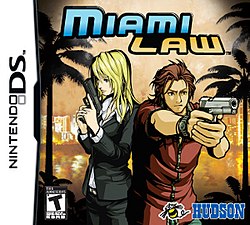Miami Law
| Miami Law | |
|---|---|
 |
|
| Developer(s) | Hudson Soft |
| Publisher(s) | |
| Platform(s) | Nintendo DS |
| Release | |
| Genre(s) | Adventure game |
| Mode(s) | Single-player |
| Aggregate score | |
|---|---|
| Aggregator | Score |
| Metacritic | 56/100 |
| Review scores | |
| Publication | Score |
| Adventure Gamers | |
| Famitsu | 29/40 |
| GamePro | |
| GamesMaster | 50% |
| GameSpot | 5/10 |
| GamesRadar | |
| GameZone | 5.5/10 |
| NGamer | 50% |
| Nintendo Power | 3/10 |
| ONM | 67% |
Miami Law, known in Japan and Europe as Miami Crisis (マイアミクライシス Maiami Kuraishisu), is an adventure video game developed by Hudson Soft for the Nintendo DS handheld system. Though produced by a Japanese company, the title was initially released in North America on June 9, 2009 and it was released in Europe on September 25, with the English localization being the first project by Gaijinworks since its establishment in 2006. Hudson Soft worked closely with Gaijinworks founder and head translator Victor Ireland on the project, who sent a research team to Miami, Florida to aid in development of the title. The game features music by hip hop group Miami Beat Wave, who were licensed by Ireland to give the game's location an authentic feel.
Inspired by prime-time crime drama television series, Miami Law follows the exploits of Miami Police Department Officer Martin Law and FBI agent Sara Starling as they attempt to bring down a domestic terrorist organization. Gameplay for the title varies depending on which character a player chooses, with largely action sequence for Martin and puzzle-based scenarios for Sara.
Miami Law is a point-and-click adventure game where players must gather clues, read text, and become involved in the story in order to solve mysteries and move the plot forward. The game uses a mixture of three-dimensional computer graphics for action sequences and two-dimensional character images for story scenes. Players are given the choice of assuming the role of either Martin Law, whose scenarios largely involve action scenes such as car chases and shoot-outs, or Sara Starling, who primarily uses puzzle-based gameplay such as analyzing clues and compiling evidence. A player is given the opportunity to switch between characters at certain points in the game's story, with the plot being affected by which character is used at different points in the narrative. In addition to normal gameplay elements, Miami Law also includes minigames such as Sudoku and Texas hold 'em that can be accessed after the player has fulfilled certain requirements during the main game.
...
Wikipedia
